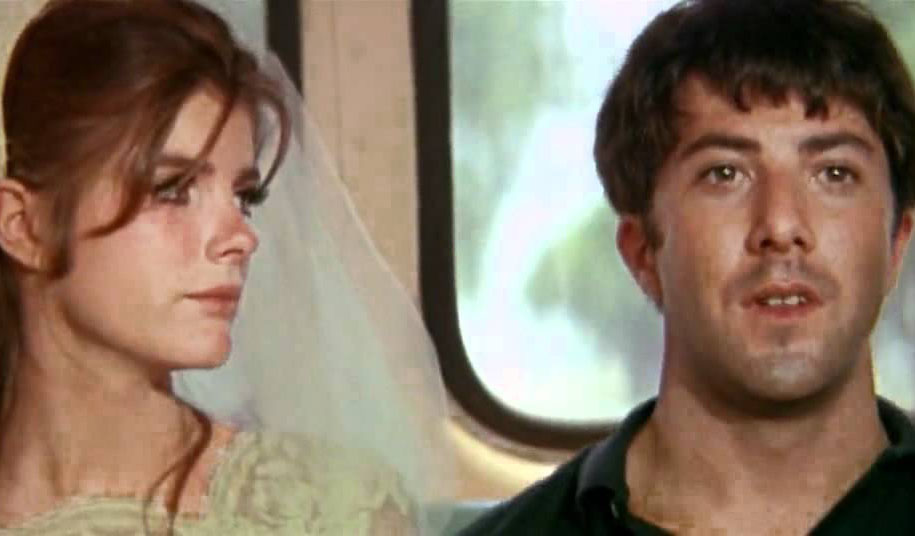In the final scene of “The Graduate,” as the giddy runaway lovers Elaine and Benjamin take their seats at the back of a bus, we are plunged into a moment of sudden stillness that interrupts the breathless speed of the previous sequence.
While moments ago life swelled to epic proportion, now it is small again. Where there was riotous, loud commotion, there is now dull white noise.
For Benjamin, this stillness marks the end of his swerving, sprinting, leaping race to disrupt Elaine’s wedding. For Elaine, stillness presents the first opportunity to reflect on a choice — that of leaving her groom at the altar —made in unimaginable haste.
In this quiet thrum, we are left to guess what the two are thinking as their smiles falter and fade from their faces. Perhaps they are thinking of the wreckage they have left behind. Perhaps they are also wondering what they really know about one another.

Had the movie ended sooner, we would interpret its final sequence as one of triumph. As it is, however, we are left to reflect on a future in which uncertainty and openness stymie the impulse to imagine that life, for the heroes of any great story, freezes at the moment the credits roll.
So it is with Parashat Beshalach. Like the sea that split before the Israelites, we find ourselves at a point of division, in which ending and beginning tower on either side of us like walls.
The parasha first announces itself as a conclusion. The enemy, Pharaoh, is vanquished. The hero, Moses, is vindicated. Led by Miriam, the women take out their timbrels and sing the triumphant “Song of the Sea.” All that’s left is to march away into the horizon and let us, the readers, savor the moment.
But Beshalach quickly reveals itself to be a beginning as well. The music of the timbrels dies away. The sea, former site of miracles, now laps placidly upon the shore. The impressive built environment of Egypt, that place of shimmering gold and manmade mountains, has been traded for the empty monochrome soundstage of the Sinai Desert.
Suddenly, the Israelites are alone. Alone with God. Alone with Moses. Alone with themselves.
They had been running, but now they are still. They had been filled with faith, but now they are unsure. It had felt like a choice, but now they can’t remember.
We are quickly introduced to the dynamics that will become the central tension of the Israelites’ sojourn in the wilderness. The people complain, and Moses tries to assuage them. Moses is exasperated by the people’s restlessness, and he cries to God for help. God issues a command, and the people disobey Him.
Had the Torah ended before all this, we could have imagined that the Israelites made it to the promised land with the joyful “Song of the Sea” still on their lips, but such endings are inauthentic. In Torah, as in life, every ending blooms into a new beginning. Order flows into chaos, into tohu va’vohu, which in time returns to order.
In Torah, as in life, every ending blooms into a new beginning.
Trapped together in the desert, Moses and the Israelites are beset by claustrophobia, yet paradoxically it is a claustrophobia agitated by the very openness of their surroundings. Though the decree that they must wander for forty years has not even been issued yet, the Torah announces it to us here, as if to emphasize that we are in a place of unbearable structurelessness, both spatial and temporal.
The neatly ordered epic of Exodus, with its moral clarity and carefully plotted drama, is gone. In its place is a void where nothing has proportion. Great miracles seem small and small troubles loom large. The mighty wonders with which God delivered the Israelites no longer seem so impressive, while each instance of the peoples’ grumbling against Moses grates on the ears as he imagines enduring this stiff-necked people day after day after day.
At the end of “The Graduate,” as they speed down the highway, Benjamin and Elaine look at each other but never at the same time. In Parashat Beshalach, Moses, God and the Israelites examine one another, but do not meet each other’s gaze.
Do we see their breathless smiles fading from their faces?
Matthew Schultz is the author of the essay collection “What Came Before” (2020). He is a rabbinical student at Hebrew College in Newton, Massachusetts.
 RSS Feed
RSS Feed















 January 29th, 2021
January 29th, 2021  Awake Goy
Awake Goy  Posted in
Posted in  Tags:
Tags: 













